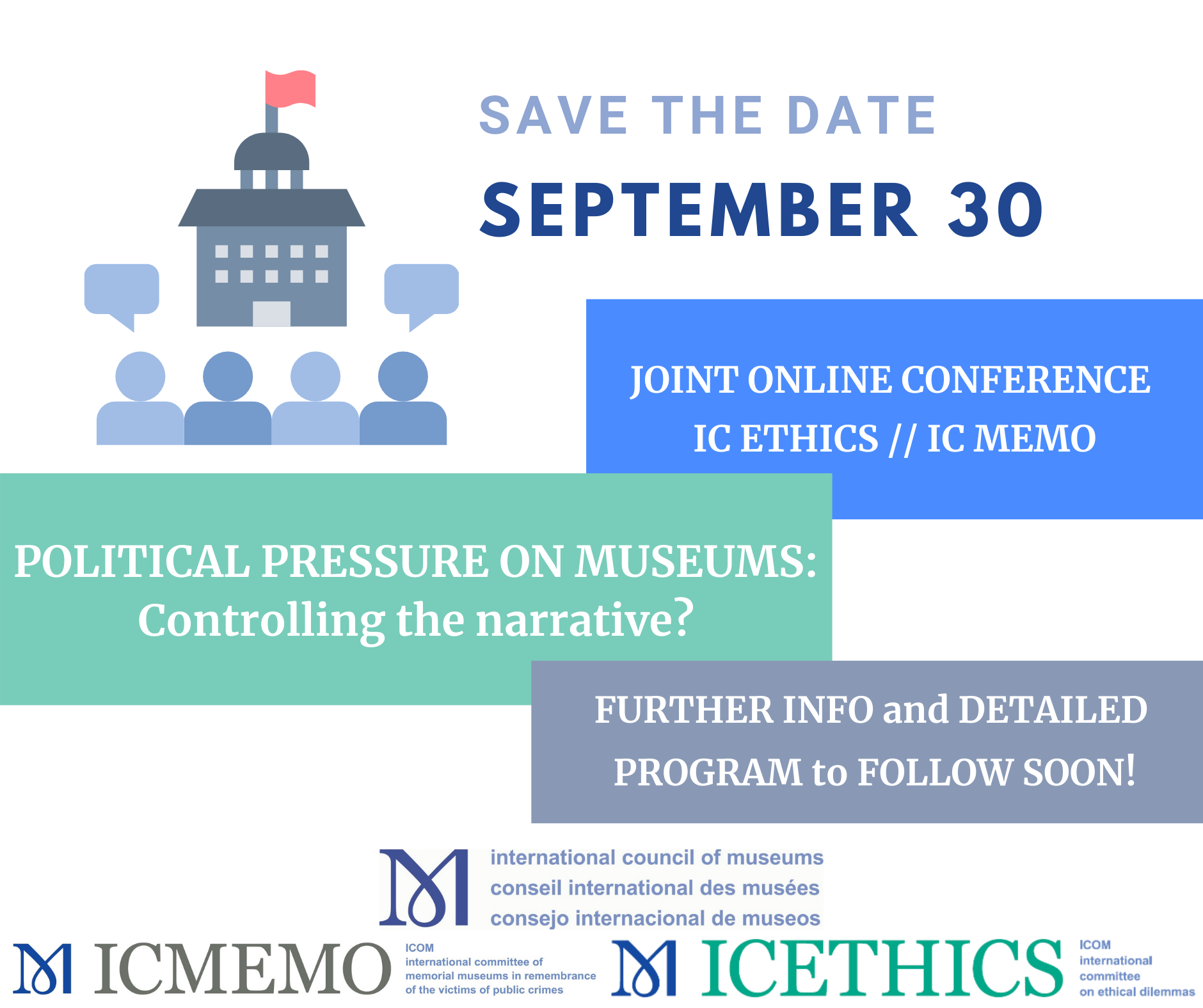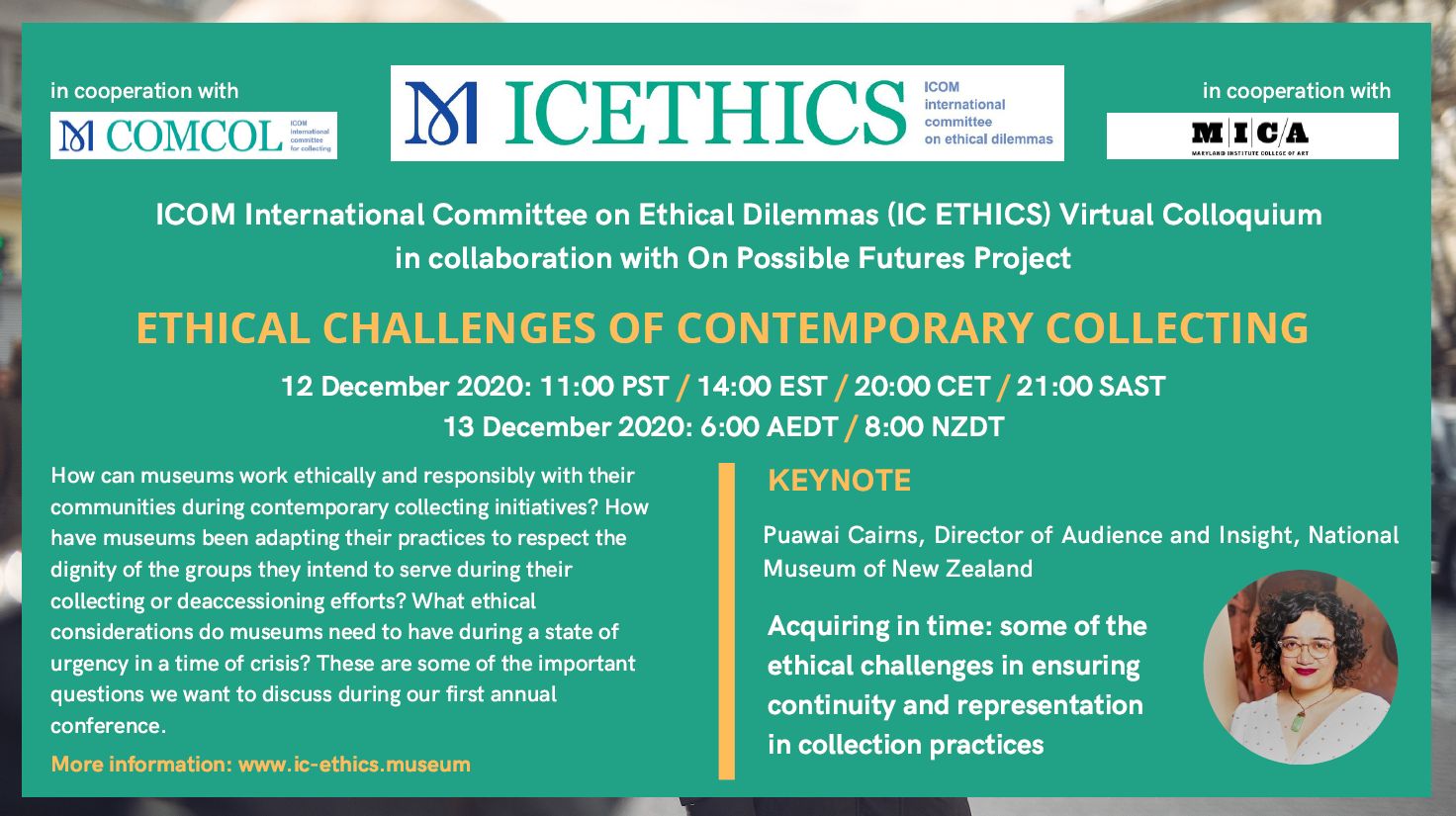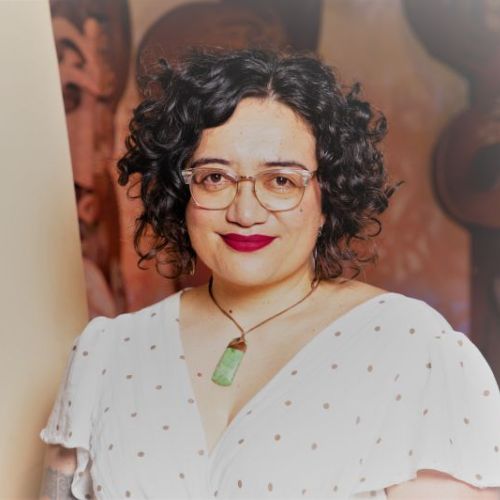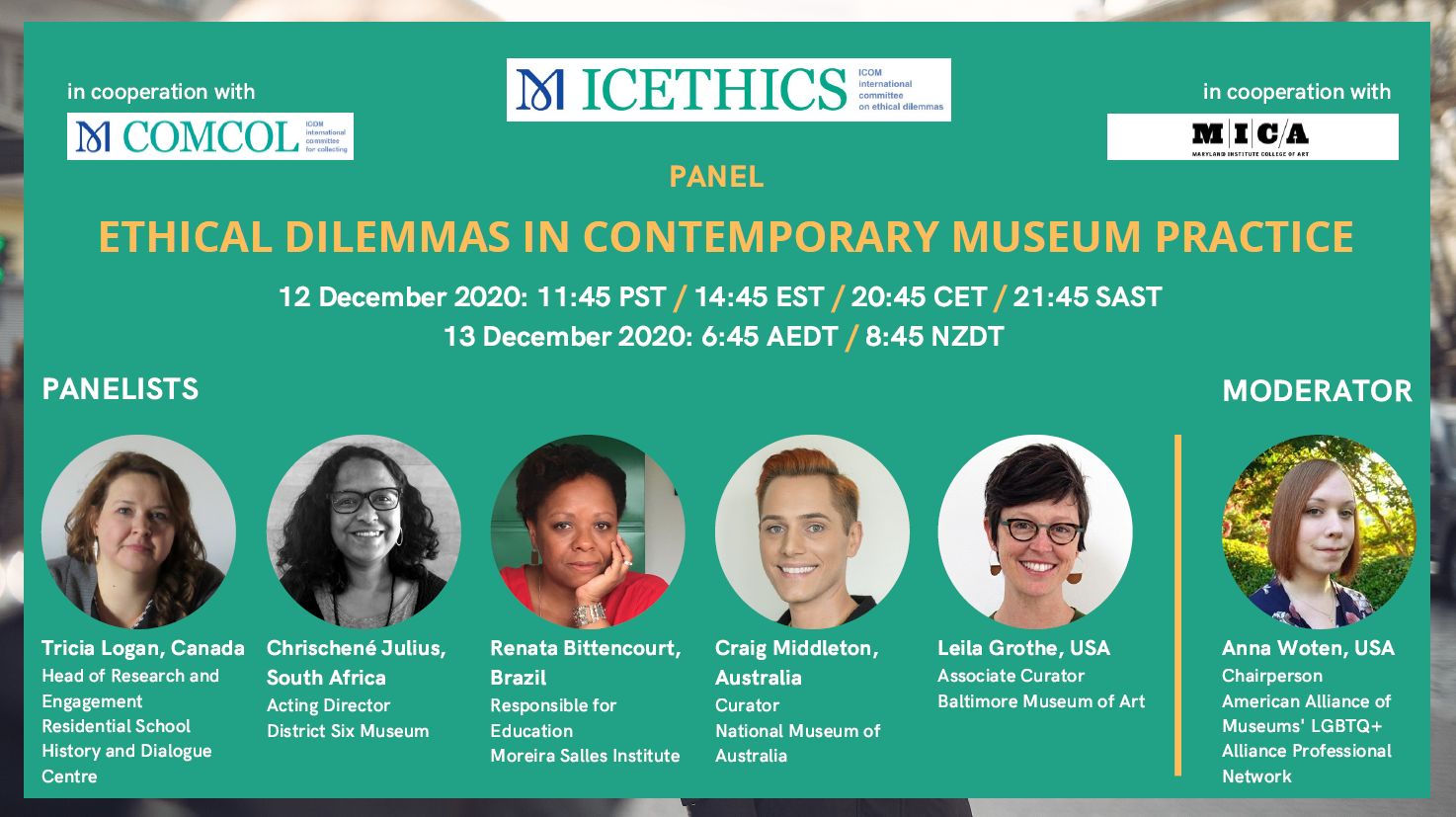The State of Museum Ethics Today
Date: July 27, 2023
Time: 11:00am-12:30pm (ET – New York), 5:00pm-6:30pm (CET – Paris)
Register Here
In 2023, the International Council of Museums (ICOM), Museums Association (UK) and the American Alliance of Museums (AAM) are all reworking their Codes of Ethics in response to “changing conditions, values and ideas.”1 This rare moment of synchronous rethinking about the codified ethics of the profession offers a valuable opportunity to consider how codes of ethics, and the different approaches that professional organizations take in creating them, shape the field’s ability to respond to ethical dilemmas. In this online conference, representatives from ICOM’s Standing Committee on Ethics, the Museums Association, AAM, and Brazil’s museum sector, along with museum ethicist Janet Marstine, will discuss the current state of museum ethics, and consider the ways that the professions’ codes of ethics are created, implemented and used. It will unpack the relationships between the different codes and the emergent, complex ethical dilemmas that museum professionals face in the course of their work, and ask how the sector’s ethics practices might need to evolve to meet the needs of the future.
Speakers: Sally Yerkovich (ICOM Standing Committee on Ethics), Julie Hart (American Alliance of Museums), India Divers (Museums Association – UK), Tereza Scheiner (Federal University of Estado do Rio de Janeiro), Janet Marstine (Museum Ethicist). Moderated by Suse Anderson (IC-Ethics).
1 “AAM Code of Ethics for Museums.”
Past conference
Joint online conference IC Ethics // IC MEMO

POLITICAL PRESSURE ON MUSEUMS: CONTROLLING THE NARRATIVE?
Thursday, 30th of September 2021 – 8 AM EDT New York // 2 PM CEST Paris // 10 PM JST Kyoto – 3 hours
Political pressure on museums is leaving museum professionals with many ethical challenges to consider.
How far should museums stretch or compromise when politics or politicians in charge demand approaches which are not sound in light of professional standards?
What about the personal integrity of museum professionals towards their field and social responsibility? Who can they turn to for help, if needed?
In short: Where is the line drawn for the museum professional when torn between partisan political interests and the profession’s standards? How can the museum community protect its standards and support its members?
Note: This year’s joint online conference is a starting point, or teaser, for a larger conference to be held within the context of ICOM Prague 2022 (August 20-28) and in line with its topic, “The Power of Museums.” IC Ethics and IC MEMO plan to further explore the theme, under the working title, “Narratives of Memory and the Power of the Museum in Shaping Identity: Who holds the key?“
– further info and a detailed program will follow soon!
Ethical Challenges of Contemporary Collecting
12 December 2020: 11:00 PST / 14:00 EST / 20:00 CET / 21:00 SAST
13 December 2020: 6:00 AEDT / 8:00 NZDT
Our first international conference takes place in form of a half-day virtual colloquium via Zoom, in collaboration with the On Possible Futures Project / MICA Maryland Institute College of Art and in cooperation with COMCOL – ICOM International Committee for Collecting.
How can museums work ethically and responsibly with their communities during contemporary collecting initiatives? How have museums been adapting their practices to respect the dignity of the groups they intend to serve during their collecting or deaccessioning efforts? What ethical considerations do museums need to have during a state of urgency in a time of crisis? These are some of the important questions we want to discuss during our first annual conference.
Conference language is English. The event will be live-captioned and the recording /transcripts will be available in French and Spanish after the livestreaming here as well as On Possible Futures project and COMCOL websites.
The duration of the event will be approx. 2,5 hours.

KEYNOTE

Acquiring in time: some of the ethical challenges in ensuring continuity and representation in collection practices
Puawai Cairns, Director of Audience and Insight, National Museum of New Zealand
Puawai Cairns (Ngāi Te Rangi, Ngāti Ranginui, Ngāti Pūkenga) is Director of Audience and Insight at Museum of New Zealand Te Papa Tongarewa, and has previously been the Head of Mātauranga Māori for two years, leading the Māori curatorial team and the Māori collection. She specialises in contemporary social history research, curating and collecting to reflect the stories of Māori communities, and has co-authored a book on protest material culture, called “Protest Tautohetohe: Objects of Resistance, Persistence and Defiance” (Te Papa Press) which has recently won the prize for Best Illustrated Non-fiction at the 2020 NZ Ockham Book Awards. Puawai has worked as a curator on numerous projects, and advises nationally and internationally on museums and curatorial practice. She has a particular interest in contributing to the debates that surround decolonisation and indigenisation, and is focused on growing and enhancing Māori representation and participation across the New Zealand heritage and arts sectors.
PANEL: ETHICAL DILEMMAS IN CONTEMPORARY MUSEUM PRACTICE

Tricia Logan (Canada) is the head of Research and Engagement at the Residential School History and Dialogue Centre at UBC and is cross-appointed as an Assistant Professor at the UBC School of lnformation. Tricia is a Métis scholar with more than 20 years of experience working with Indigenous communities in Canada. She has held roles at the National Centre for Truth and Reconciliation, the Canadian Museum for Human Rights, the Métis Centre at the National Aboriginal Health Organization, the Aboriginal Healing Foundation and the Legacy of Hope Foundation. She has a Master of Arts in Native Studies from the University of Manitoba, and completed her PhD in History at Royal Holloway, University of London. Her PhD is entitled Indian Residential Schools, Settler Colonialism and Their Narratives in Canadian History. Originally from Kakabeka Falls, Ontario, Tricia has worked with Survivors of residential schools, completed research on the Métis experience in residential schools, and worked with Métis communities on a Michif language revitalization project.
Chrischené Julius (South Africa) is currently Acting Director of the District Six Museum. She has been involved in a number of exhibition, research and community-driven archival projects, with a particular focus on oral history research and the way this methodology has evolved as part of the ethos of a community museum. She manages the archive of the District Six Museum and is a history and museum studies graduate of the University of the Western Cape and the University of Cape Town.
Renata Bittencourt (Brazil) is responsible for the Education Department at Moreira Salles Institute in São Paulo Brazil. She is an art historian having developed research on black representation in Brazilian art in her master’s and PhD. She served as Executive Director at Instituto Inhotim, as Director of Museum Processes at the Brazilian Museum Institute (Ibram – MinC), as Secretary at the Federal Government Department of Citizenship and Diversity of the Ministry of Culture (MinC), and has also worked at the São Paulo State Department of Culture and at Itaú Cultural. She was awarded by the São Paulo Art Critics Association (APCA) and by Fulbright.
Craig Middleton (Australia) is a Curator at the National Museum of Australia and Visiting Fellow at the Australian National University. His research interests are in Australian social and political history, specifically histories of LGBTIQ+ identified communities and critical museology. His book, co-authored with Dr Nikki Sullivan, Queering the Museum was published by Routledge in November 2019. Craig tweets at @_museumguy.
Leila Grothe (USA) is an Associate Curator for Contemporary Art at The Baltimore Museum of Art. Grothe was previously the Associate Curator at the Wattis Institute at the California College of the Arts in San Francisco, working largely with emerging and mid-career artists such as Rosha Yaghmai, Yuki Kimura, and Melanie Gilligan. Along with her work at CCA’s Wattis Institute, Grothe has been a guest lecturer and advisor to the CCA Curatorial Practice graduate program. She has also worked as the Director for Curatorial Affairs for the 500 Capp Street Foundation, the collections manager for the Joyner/Giuffrida collection, the Assistant Director of External Affairs at Southern Methodist University’s Meadows School of the Arts, and as a project manager for Creative Time in Dallas. Grothe has an MA in Curatorial Practice from California College of the Arts and a BA in Art History with Honors from Southern Methodist University.
Anna Woten (USA) is an LGBTQIA+ activist and museum professional with a focus in collections management, community engagement, and exhibit content development. Anna also works both nationally and internationally towards LGBTQIA+ inclusion in cultural institutions. She currently serves as Chairperson of the American Alliance of Museums’ LGBTQ+ Alliance Professional Network and works on other international DEAI-focused projects.
Contact:
Armando Perla, armandomuseos@outlook.com
